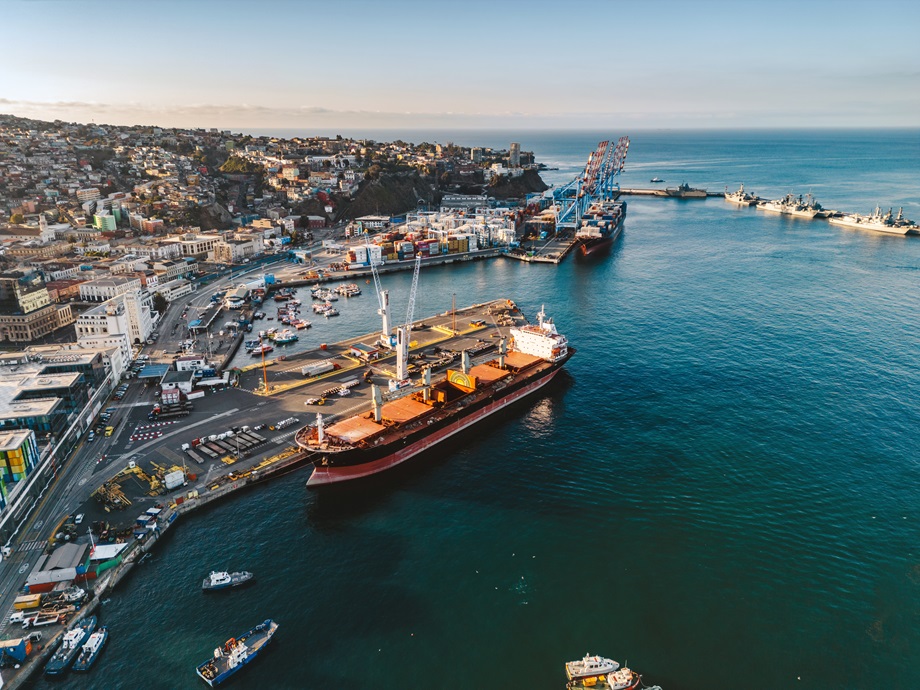
Chile: A market to watch for Canadian exporters
Author details
Dennis Jones
EDC International Trade Writer
In this article:
With more than 30 free trade agreements in place spanning 65 economies, Chile is a country on the move. Stable, prosperous and with a wide range of industrial resources and manufacturing sectors, this market has long been an attractive one for Canadian companies.
“Chile is mobilizing for growth,” says Jorge Rave, Export Development Canada’s (EDC) regional vice-president for Latin America and the Caribbean.
“That’s at the core of the country’s outlook on the future, and why we see so many opportunities here—perhaps more than in any other part of Latin America. We see major opportunities for Canadian investment and for Canadian expertise that can help Chilean players support the growth that the country needs.”
Daniel Benatuil, an EDC senior economist with responsibility for Latin America, says the country’s robust institutional framework, high governance quality and market-friendly legal framework are key strengths of Chile’s commercial environment.
“The regulatory and operating environments are broadly predictable, while the strong financial sector, a credible fiscal framework and long track record of prudent macroeconomic management form an excellent platform for economic growth. As a result, Chile boasts a profile of low commercial, political and sovereign risks, with low levels of corruption,” Benatuil says.
Chile enjoys a long-standing relationship with Canada
In 1997, our two countries signed the Canada-Chile Free Trade Agreement (CCFTA). Bilateral trade has almost quadrupled since then, exceeding C$3.4 billion in 2022, and Chile has become Canada’s top investment destination in South and Central America. The CCFTA and our close relationship will support rich future commercial, trade and investment opportunities for Canadian companies.
Despite its relatively small population of 19.6 million, the country is home to a wide range of export, manufacturing and investment sectors. Major industrial and resource clusters, like mining and vital commodities for the global energy transition, infrastructure (as well as green building), forestry, agri-food and renewable power.
While the domestic market isn’t large, many of the clusters are home to major international companies that produce goods in Chile for export to the Indo-Pacific market and elsewhere. So, it’s important to plan for the long-term and find ways to work with these large multinational exporters to potentially gain access to additional markets.
“Chile has one of the most market-oriented economies in Latin America,” says Christian Daroch, EDC’s Global Business Development director for Chile, who is based in Santiago. “Our economy is similar to Canada’s in that it’s based on commodity exports, resources and services.”
According to Daroch, Chile’s major sectors include:
- The biggest single resource cluster is mining, especially of strategic minerals such as lithium, silver, gold and copper. Chile produces about 30% of the world’s copper and is one of the world’s largest suppliers of lithium.
- Chile’s forestry cluster is a major exporter of wood products and includes two of the three largest pulp and paper companies in the world.
- Chile also has a vibrant agri-food and fisheries cluster, run on sustainable lines, that includes products such as wine, fresh fruit and seafood. Canadian investors are already very active in this sector.
- Chile has no domestic fossil fuel production, so the country has necessarily turned to clean energy. As a result, it has become one of the most advanced markets in the world for solar power, wind power and energy storage. There’s a lot of investment in the sector, with numerous international companies engaged in various projects, including Canadian firms.
- On the infrastructure side, there’s a large and well-developed public-private partnership (PPP) sector with substantial foreign investment, including Canadian companies. Projects include highways, hospitals, urban and social infrastructure and more. There are also infrastructure opportunities related to clean technologies for water, desalination and waste management, and in advanced manufacturing and advanced technologies.
Daroch pointed out that many supply chains feed into these local and regional clusters, which ultimately link back to international supply chains. Canadian vendors can become part of this web, but should be aware that there’s a lot of competition from European, Japanese, American and Chinese companies.
“It’s a very competitive landscape with sophisticated buyers that demand the right combination of price, product lifecycle cost and the quality of a supplier’s in-market services,” Daroch says.
You should also check out
With timely insights and financial analysis from our experts, Export Development Canada can help you enter new markets, grow your global business, and reduce risks with confidence.
In EDC’s Country Risk Quarterly, an interactive tool that offers timely information about 50 markets, the entry for Chile shows the country with low to relatively low ratings for hazards such as short-term risk, sovereign default and expropriation. More general challenges include:
- Economic and political uncertainty
According to Benatuil, one of the biggest challenges in recent years for Canadian investors and exporters is the political and policy uncertainty, with the social unrest of 2019 resulting in two failed attempts at writing a new constitution.
“Since then, the government has been pursuing policy changes and legislative reforms to address longstanding social grievances while maintaining international competitiveness and a market-friendly investment framework. This should support continued economic stability.”
- Competitiveness
The business environment is extremely competitive, with many domestic and foreign firms, so a company needs to present an extraordinarily strong value proposition when it approaches potential customers. If it’s not clear on its value proposition, and if it doesn’t communicate that proposition in a powerful way, it’s unlikely to succeed in the Chilean market.
- Business culture
Chile’s business culture is highly conservative, and its businesspeople are more cautious than their counterparts elsewhere in Latin America. Negotiating contracts can take more time than you expect, since your Chilean customers and their lawyers will closely scrutinize the wording of every clause.
The regulatory regime is complex, and you can expect delays in processing government-mandated paperwork and obtaining approvals and permits. If you’re selling to the government, be aware that the procurement process is slow.
- Security concerns
Security has become an issue, especially in the large cities. This concern has increased progressively over the past 10 years. This hasn’t yet, however, affected foreign investment.

A Canadian company entering an overseas market for the first time needs to be well-prepared, and Chile is no exception. Some things to be aware of include:
- Learn about the market
You will need advice and information, both general and specific, on the Chilean market. This can be obtained from the so-called “Team Canada” on the ground, led by the Canadian Embassy in Santiago, the Trade Commissioner Service, and EDC, all of whom are familiar with Chile, with the business law and with doing business in this exciting and vibrant market. Investors and exporters alike should carry out rigorous due diligence on potential Chilean partners.
- Identify the local players
Some Chilean sectors are populated mainly by large international companies. If you’re a Canadian exporter or investor operating in one of these sectors, you’ll likely be dealing with a few large buyers that have extensive control of the market. Be prepared to use different business strategies depending on whether you’re selling to large companies that export most of their production internationally, or to smaller players that operate mainly in Chile’s domestic market.
- Use our bilateral agreements
Be sure to take advantage of the CCFTA when you’re exporting to Chile. Also be aware that there’s a double taxation agreement that prevents Canadian companies operating in Chile from being taxed in both countries.
- Establish a local presence
If you’re supplying goods to Chilean buyers, you should have a local presence, either in the form of an affiliate or through a Chilean partner such as an agent or dealer. This is a prerequisite for success, since Chilean buyers expect to have local on-demand service for maintenance, repair, training or other purposes. It’ll be difficult for a Canadian company to operate successfully in Chile without having either a direct presence in the market or a local partner.
- Prepare environmental, social, and governance (ESG) strategies
Chile’s ESG framework is stringent, so your company will need to have a strong ESG program in place before it can enter the market. Chilean companies will expect you to arrive already prepared to comply with the particular ESG requirements of their sector.
Santiago Ribadeneira, EDC senior environmental and social advisor, says you’ll need to understand the relevant ESG requirements before venturing to Chile, whether they be environmental, social, health, safety or other specific certifications.He also urges Canadian exporters to have a company ESG framework to accommodate these requirements, and a strategy for implementing them in Chile.
“Note that your Chilean customer won’t help you with this. They see it as your responsibility and will expect you to be compliant when you arrive. If you don’t have a clearly articulated ESG framework and implementation strategies to match, you won’t likely be able to operate in Chile,” Ribadeneira says.
There are certain sectors, especially the extractive ones, where this is especially important. Every mining company, for example, is signatory to several international standards. If your firm has already achieved certification under these standards, you’ll have a competitive advantage over companies that haven’t.
Finally, a Chilean company will normally do very careful due diligence on a Canadian firm’s ESG policies and behaviour before it considers a business relationship. If you’re working on a deal, you can expect to undergo close scrutiny from your potential Chilean buyer about your ESG capabilities.
If you need to know more about doing business in Chile, talk to us at EDC. We can help you:
- find the experts you need
- set up a visit to the country
- understand the culture and your Chilean counterparts
- do due diligence on your counterparts, their ESG status and their potential liabilities
- check on the reputation of potential partners
- check on regulations and laws that may apply to your exports or investments
You can also:
- Visit our Export Help Hub to explore the potential of growing your business.
- Explore our country and economic info pages for Chile.
- Check out EDC’s Country Risk Quarterly, which examines economic uncertainties at the global and country level.
- Connect with targeted global companies through the EDC Business Connection Program.
And don’t forget to connect with our partners, the Canadian Trade Commissioner Service and the Chilean—Canadian Chamber of Commerce (English translation available).















